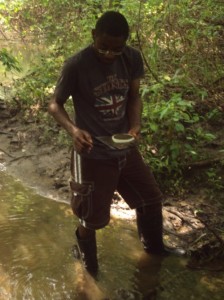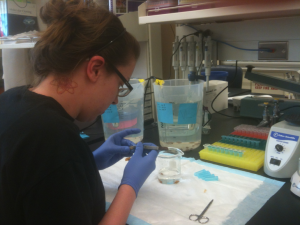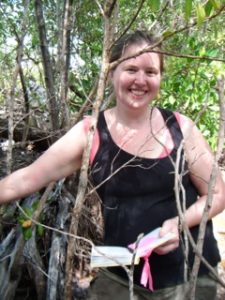The annual Frontiers in Biology Research Colloquium was held on Friday 23 March 2012. The following students were recognized for excellence in research.
Senior Ph.D. student winner

Phillips Akinwole
Sediment microbial communities form an important component of stream ecosystems yet the natural variations in stream microbial biomass and community structure across spatial scales ranging from biogeographical patterns to difference within and among riffles are not yet fully described. As part of my PhD work I examined microbial biomass and community structure of streambed sediments in forested streams within two watersheds (White Clay Creek, PA and Neversink, NY) across 3 spatial scales (riffle, order, watershed). Overall, the magnitude of within stream variation in microbial biomass was small compared to the variability noted among streams and between watersheds while microbial community structure displayed a distinct watershed-level biogeography, as well as variation along a headwater streams-large stream gradient. The importance of phototrophic microeukaryotes increased with increasing stream order suggesting that increasing light availability, as predicted by the River Continuum Concept, contributed to the observed pattern. |
Junior Ph.D. student winner
 Samantha Perkins Samantha Perkins
Freshwater mussels are keystone species in freshwater ecosystems and are currently in global decline. One reason for this decline that cannot be immediately rectified is the threat of global warming, especially since many species of freshwater mussel are already living at their upper thermal tolerance limits. My research aims to aid conservation agencies currently propagating mussels for transplantation into the wild by combining traditional ecological condition techniques with transcriptomic techniques to create an efficient predictive model of mussel response to IPCC predicted global warming scenarios to aid in mussel culture and relocation strategies. |
Masters student winner

Amanda Hanninen
My research examines how hormones mediate changes in life-history traits in the self-fertilizing and amphibious fish, the mangrove rivulus (Kryptolebias marmoratus). More specifically, I am investigating how tidal and food availability gradients may drive age-dependent changes in steroid hormones (cortisol, estradiol, and androgens) and reproductive investment. |